What is a Short-term Visa? Application process, required documents, key points for Short-term Visa, etc.
To customers who
☑Are international students and would like to invite the parents from their home country to the graduation ceremony.
☑Applied for a Short-term Visa on their own, but was rejected…
☑Want to invite children from their home country to Japan during summer vacation.
☑Want to invite foreign staff to Japan for business negotiations.
☑Want to invite parents from their home country to give birth.
☑Want to prepare to open a business in Japan
What is a Short-term Visa?
A Short-term Visa is a visa for coming to Japan for a short period for activities such as sightseeing in Japan, visiting relatives in Japan, and business contacts in Japan. This is commonly referred to as a “tourist visa” and allows you to stay in Japan for up to 90 days.
In Japan, To facilitate the smooth entry and short-term stay of foreigners for purposes such as business, conferences, tourism, visiting relatives or friends, etc., Japan has concluded mutual visa exemption agreements with nations and regions where there are relatively few immigration control issues and visa exemption measures are implemented for passport holders from 69 countries and regions as of April 2023.
However, please note that even for nationals of those exempted countries, prior application (under the jurisdiction of the Ministry of Foreign Affairs) is required for entry and short-term stays. Therefore, the procedures for such applications are still necessary.
Also, please note that if you engage in activities that receive remuneration in Japan, or if you stay longer than the period of stay determined by each country, you will need a status of residence.
The period of stay from 69 countries and regions of visa-exemption is generally 90 days per entry and a maximum of 180 days per year.
Indonesia and Thailand have until the 15th, Brunei on the 14th, and the United Arab Emirates on the 30th.
- List of countries/regions exempted from Short-term Visas
| Asia | Oceania | Spain |
| Indonesia (Note 1) | Australia | Slovakia |
| Singapore | New Zealand | Slovenia |
| Thailand (Note 2) | Middle East | Serbia (Note 2) |
| Malaysia (Note 3) | United Arab Emirates (Note 2) | Czech |
| Brunei | Israel | Denmark |
| South Korea | Qatar (Note 9) | Germany (Note 8) |
| Taiwan (Note 4) | Türkiye (Note 7) | Norway |
| Hong Kong (Note 5) | Africa | Hungary |
| Macau (Note 6) | Tunisia | Finland |
| North America | Mauritius | France |
| America | Lesotho (Note 7) | Bulgaria |
| Canada | Europe | Belgium |
| Central and South America | Iceland | Poland |
| Argentina | Ireland (Note 8) | Portugal |
| Uruguay | Andorra | North Macedonia |
| El Salvador | Italy | Republic of Malta |
| Guatemala | Estonia | Monaco |
| Costa Rica | Austria (Note 8) | Latvia |
| Suriname | Netherlands | Lithuania |
| Chile | Cyprus | Liechtenstein (Note 8) |
| Dominican Republic | Greece | Romania |
| Bahamas | Croatia | Luxembourg |
| Barbados (Note 7) | San Marino | United Kingdom (Note 8) |
| Honduras | Switzerland (Note 8) | |
| Mexico (Note 8) | Sweden |
(As of September 1, 2023)
(Note 2)Visa exemption for the United Arab Emirates (after November 1, 2022), Thailand (after July 1, 2013), and Serbia (after May 1 2011) is applicable to those who own ICAO standard IC passport. Those who do not have an IC passport are required to obtain a visa in advance.
(Note 3) Visa exemption for Malaysia (after July 1, 2013) is limited to those who hold an ICAO standard IC passport. For those who do not have an IC passport, we recommend that you obtain a visa in advance. (If you enter Japan without obtaining a visa in advance, you will be subject to strict immigration inspection upon entering Japan, and as a result, you may not be able to enter the country)
(Note 4) Taiwan visa exemption is limited to those who hold a Taiwan Passport with their ID number written on it.
(Note 5) Hong Kong visa exemption is limited to those who hold Hong Kong Special Administrative Region (SAR) passports and those who hold British National Overseas (BNO) passports (Hong Kong residency holders).
(Note 6) Macau visa exemption is limited to those who hold a Macau Special Administrative Region passport.
(Note 7) Barbados (after April 1, 2010), Turkey (after April 1, 2011), and Lesotho (after April 1, 2010) visa exemption is limited to those who hold an ICAO standard machine-readable passport (MRP). If you do not have an MRP, we recommend that you obtain a visa (if you enter Japan without obtaining a visa in advance, you will be subject to strict immigration inspection upon entry to Japan and may not be able to enter the country as a result).
(Note 8) People from the these countries are allowed to stay for up to 6 months under the visa exemption arrangement, but if they wish to stay for more than 90 days, they must complete the procedure for extending the period of stay at the Immigration Office (Regional Immigration Bureau) before the expiration of the period of stay.
(Note 10) Measures have been introduced to encourage the acquisition of visas for Peru (after July 15, 1995) and Colombia (after February 1, 2004). If you enter Japan without obtaining a visa in advance, you may be subject to strict immigration inspection upon entering Japan and may not be able to enter the country as a result.
| Overview of Short-term Visa | |
|---|---|
| Activities | Entering the country for business, meetings, sightseeing, visiting relatives/acquaintances, etc., staying for a short period of time |
| Period of stay | Within 90 days, 30 days, or 15 days |
| Standard ministerial ordinance | Exemption in 69 countries/regions that have mutual visa exemption agreements |
Applying for a Short-term Visa
We will provide an easy-to-understand explanation of the application process, required documents, standard examination period, etc. when applying for a Short-term Visa.
Application flow
Visas are exempted for people from 69 countries and regions that have mutual visa exemption agreements, for those who enter the country with a passport from another country and stay for a short period of time, it will be required to apply for a visa in advance (under the jurisdiction of the Ministry of Foreign Affairs). Here, we will clearly explain the application process.
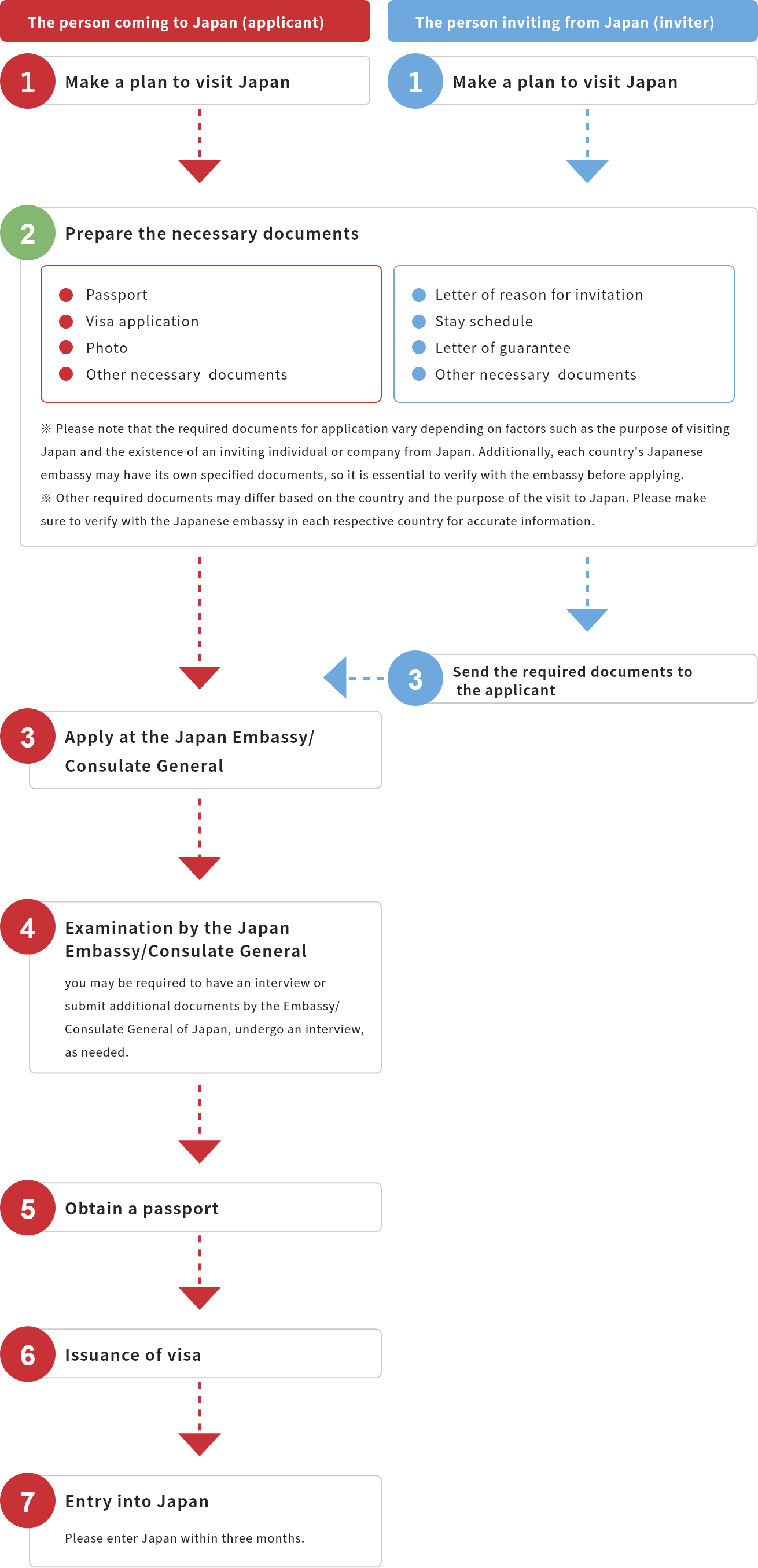

In most cases, the applicant can directly bring an application to a Japanese embassy/consulate-general in a foreign country, but in some countries such as India, it is necessary to entrust the agency recognized by the Japanese embassy/consulate general to proceed with the application, or a reservation in advance is required, so please make sure to check the details of each Japanese embassy/consulate-general in your country before you start preparations. Please (Japanese embassies/consulates in each country)。
Please note that this application is under the jurisdiction of the Ministry of Foreign Affairs, and even if a visa is not issued, the reason will not be made public. Additionally, once the issuance is refused, no applications for the same reason will be accepted for 6 months, so basically if the issuance is refused, you will have to give up on the application.
Documents required for the procedure
We will guide you through the basic required documents for applying for a Short-term Visa. The required documents listed below are general ones, and the documents you need to submit will differ depending on the situation and country, such as “the reason for visiting Japan” and “if there are people or companies in Japan offering an invitation for you”. Additionally, the Japanese embassy/consulate-general in each country may have its own requirements for documents, so please make sure to check with the Japanese embassy/consulate-general before applying.
Obtaining the appropriate documents tailored to the applicant’s situation usually requires specialized knowledge and experience. It is more reassuring to seek advice from professionals rather than invest significant effort and time only to receive undesired results. (Please feel free to make use of our office’s ” Free consultation ” service.)
| Documents to be prepared by the person coming to Japan (applicant) | |
|---|---|
| ① Passport | |
| ② Visa application form | |
| ③ Photo | |
| ④ A document showing the airplane flight or ship itinerary you plan to use (showing the scheduled date of entry and departure) | |
| ⑤Any document proving ability to pay travel expenses Income certificate/deposit balance certificate issued by a public institution (If the purpose of the trip is short-term business, etc.) A business trip order from the company you belong to, a dispatch letter, and documents similar to these. (If the purpose of the trip is short-term business, etc.) Certificate of employment |
|
| ⑥ Other required documents (*1) | |
*1 It may vary depending on the purpose of your visit and the country. Please be sure to check with the Japanese embassy/consulate general in your country.
| Documents prepared by the person inviting from Japan (inviter) | |
|---|---|
| ① Letter of Reason for Invitation | |
| ② Materials related to the reason for the invitation (if the person or spouse is Japanese, a copy of the family register is required for the purpose of visiting relatives) | |
| ③ Stay schedule | |
| ④ Letter of guarantee | |
| ⑤ One or more of the following three types of documents related to proof of the guarantor’s ability to pay travel expenses. Please note that withholding tax slips are not accepted. (1)“Taxation (income) certificate” (issued by the municipal office) or “Tax payment certificate (Form 2)” (issued by the tax office) that shows the most recent total income (2)“Copy of final tax return” with the tax office acceptance stamp. In the case of e-Tax, “receipt notification (transmittal slip (and transmittal letter) for tax return, etc. for year ○)” and “final tax return” (printed version) (3)“Certificate of Deposit Balance” Certificate of employment (if self-employed, copy of tax return, business license, etc.) |
|
| ⑥ Certificate of residence (with information on all members of the household and relationships) If you are a foreign resident, please submit complete information (excluding My Number (individual number) and resident record code). |
|
| ⑦ Copy of front and back of valid residence card (alien registration certificate) | |
| ⑧ (If the inviter is a company) Copy of corporate registration or company/organization summary statement | |
You can also download application documents such as “Letter of guarantee” and “Letter of Reason for Invitation” from the Ministry of Foreign Affairs website, please visit Ministry of Foreign Affairs website visa application documents download.
Required documents for “Extension” procedure
Short-term Visas are basically non-renewable.
However, if there are special circumstances such as “humanitarian unavoidable circumstances”, permission of Extension may be granted in exceptional cases.
- If you suffer from an illness or accident during your stay and need continued treatment in Japan.
- If you need to continue caring for your newly born child and grandchild, etc.
If you apply to extend for the reasons listed above and are granted permission, you can continue to stay for a period not exceeding 180 days regularly in a year.
If you continue to stay for more than 180 days in a year, you may be granted Extension if there are special circumstances. However, as mentioned above, short-term visitor visas basically cannot be renewed, and if you continue to stay for more than 180 days in a year, it will be renewed for the second time, and the examination will be very strict.
- If you are unable to return to your country due to a serious illness or accident that occurred during your stay.
The necessary documents according to the applicant’s situation need to be submitted to Immigration Bureau. However, the Extension of a Short-term Visa is basically not approved.
Here we will guide you through the basic required documents. These are the basic documents, and depending on the circumstances of the applicant, further document may be necessary.
Obtaining the appropriate documents tailored to the applicant’s situation usually requires specialized knowledge and experience. It is more reassuring to seek advice from professionals rather than invest significant effort and time only to receive undesired results. (Please feel free to make use of our office’s ” Free consultation ” service.)
| ① Application for permission for extension of period of residence 1 copy |
| ② Passport (present) |
| ③ Document (*1) clarifying the reason why activities related to the “Temporary Visitor” status of residence are still necessary 1 copy |
| ④ Document explaining your activities since entering Japan (*2) 1 copy |
| ⑤ Documents proving that you have the ability to pay for your expenses during your stay and the means and expenses for leaving the country. Evidence document (*3) 1 copy |
*1 For example, you need to submit a medical certificate if the reason is “illness treatment”.
*2 There is no designated format, and need to be specific.
*3 For example, submit a bank balance certificate or return flight ticket.
You can download the “Application for permission for extension of period of residence ” (PDF・Excel) and other materials from the website of the Immigration Services Agency (Immigration Services Agency), so please check them out.
Required documents for “Change” procedure
We will guide you through the basic required documents for changing to a Short-term Visa (application for permission for change of status of residence). The required documents listed below are basic; additional documents may be required depending on the applicant’s circumstances.
Obtaining the appropriate documents tailored to the applicant’s situation usually requires specialized knowledge and experience. It is more reassuring to seek advice from professionals rather than invest significant effort and time only to receive undesired results. (Please feel free to make use of our office’s ” Free consultation ” service.)
| ① Application for permission for change of status of residence 1 copy |
| ② Passport and residence card (present) |
| ③ Letter of reason for changing to “short-term stay” (free format) 1 copy |
| ④ Documents proving that you have secured the necessary means of transportation to leave the country (airline tickets, etc.) as appropriate (present) |
You can download the “Application for permission for change of status of residence ” (PDF・Excel) and other materials from the website of the Immigration Services Agency (Immigration Services Agency), so please check them out.
Explanation of required documents
Here, we will introduce the “ICAO standard Machine-Readable Passport (MRP)” and “ICAO standard Machine-Readable Passport (MRP)”, which are required as conditions for exemption in some of the 69 visa-exempt countries/regions.
- ICAO standard machine-readable passport (MRP)
A machine-readable passport (MRP), defined by ICAO (International Civil Aviation Organization) standards is a passport with machine-readable personal information and other passport data written on the identity page of the passport.
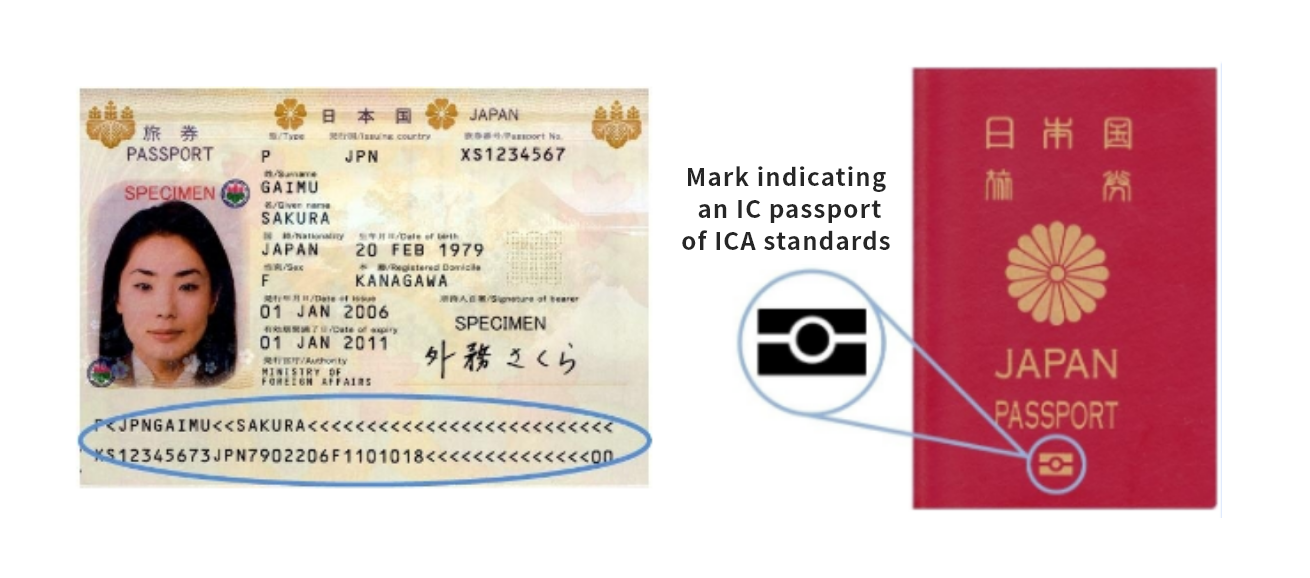
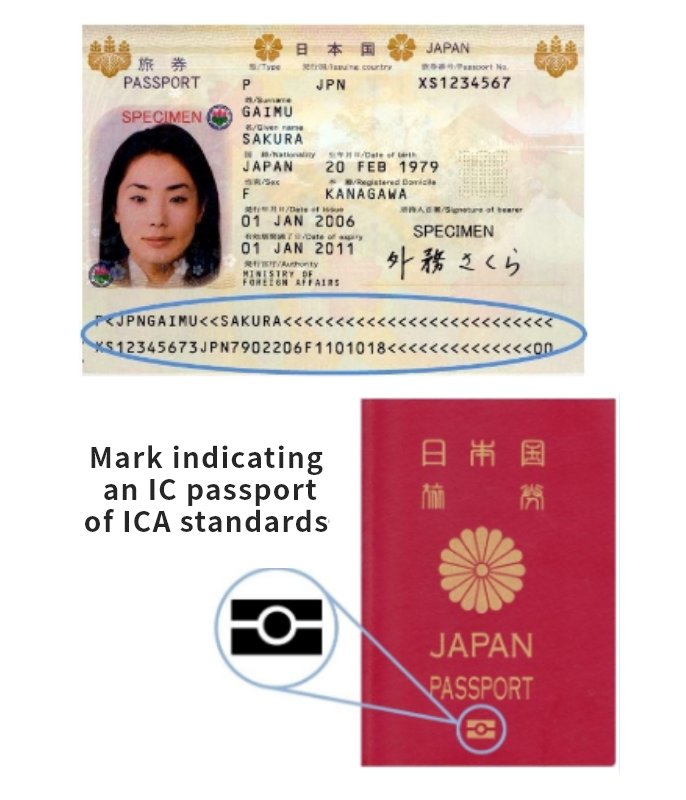
- ICAO standard IC passport
IC passports, as defined by ICAO (International Civil Aviation Organization) standards, are equipped with an IC chip that records passport data such as personal information and biometric information including a photo of the passport, and there should be a ICAO standard IC passport mark is written on the cover of the passport.
Average processing period
The average processing period for a Short-term Visa is 5 business days from the day after the application is accepted, if there are no particular problems with the application, but if there are multiple applications, it may take longer.
In addition, if there is any doubt about the content of your application, and if careful examination is deemed necessary by the Ministry of Foreign Affairs (Tokyo), it may take more than a month to issue a visa, so it is recommended to apply with plenty of time in advance.
Key points for Short-term Visas
We will clearly explain the important points to keep in mind and frequently asked questions regarding Short-term Visas.
Visa requirements
As we have seen so far, visas are exempted for 69 countries and regions with which Japan has mutually concluded visa exemption arrangements, but for people from the countries other than the 69 countries and regions with which Japan has not mutually agreed upon visa exemptions such as India and Vietnam enter Japan, they must obtain a short-term visitor visa before entering Japan, even if it is for tourist purposes.
In addition that visa being exempted nor not, you must also meet the following conditions for issuance.
- The person coming to Japan (applicant) must not have committed any crimes.
- (If a company is inviting) Credibility of the inviting company
- The purpose and schedule of the person coming to Japan (applicant) must be clear.
- Stay expenses, return travel expenses, and compliance with laws and regulations must be guaranteed by the guarantor.
Cannot engage in paid work activities
Activities that can be carried out with a Short-term Visa can be broadly divided into “business” and “other short-term stay” such as visiting relatives and friends. This “business” Short-term Visa is for those who come to Japan mainly for business purposes such as business negotiations, participation in academic conferences, conferences, exhibitions, inspections of research institutes and factories, internships, etc., and not receiving any payment in Japan.
In this way, if you apply for “business” for business purposes, any business activities should be without receiving remuneration since short-term visitor visas do not allow you to engage in remunerated work activities.
Tours, inspections, participation in seminars and information sessions, (unpaid) lectures and lectures, participation in conferences and meetings, technical guidance, negotiation and signing of contracts, (unpaid) after-sales service, advertising activities, marketing etc. are applicable.
Furthermore, when a foreign national comes to Japan for business negotiations, etc., and receives remuneration from the company to which he or she belongs in a foreign country, this does not apply to “Remunerated work activities” in case the work activities apply to the above “business”.
However, if a foreigner’s work activities are carried out in Japan, and the work activities exceed the scope of “business” mentioned above, and the foreigner receives compensation, even if the company pays the compensation, it is not allowed to come to Japan on a Short-term Visa in this case because it will be considered a “remunerated work activity.”
In the past, there have been many cases where these visas have been misused to have foreigners come to Japan for 90 days of training or classes and were found to be working illegally. Even now, the screening tends to focus on the point of whether the applicant is actually being brought to Japan as a worker or not.
Therefore, when inviting people for a period of 30 or 90 days, it is important to clarify the “Letter of Reason for Invitation” and “Activities during the period of stay” in the necessary documents to avoid suspicion of illegal employment.
If you wish to engage in remunerated work, you will need to apply for another visa depending on the case. Please contact us for details.
FAQ
What kind of activities are for a Short-term Visa?
This activity is for people who fall under any of the following categories.
①Those who staying for the purpose of sightseeing, entertainment, transit, etc.
②Those who staying for the purpose of recreation, medical treatment, etc.
③Those who participate in competitions, contests, etc.
④Those who visiting relatives, acquaintances, etc.
⑤Those who staying for the purpose of factory tours, inspections, etc.
⑥Those who attend seminars, briefing sessions, etc., and those who give lectures, etc. at seminars, briefing sessions, etc.
⑦Those who participate in conferences and other meetings.
⑧Those who have a base of professional activity in a foreign country and engage in short-term commercial activities such as business communications, business negotiations, contract signing, after-sales service, advertising, and market research.
How long is the stay period of the Short-term Visa?
I applied for a regular visa, but it was denied. I really want to go to Japan, so is it possible to visit Japan repeatedly with a Short-term Visa?
I run companies in Japan and China. Is it okay for me to go to Japan with a Short-term Visa?
Can I extend my Short-term Visa?
What documents are required if I come to Japan to visit a friend?
What the applicant should prepare
① Passport
② Certificate of reservation for air or boat itinerary
③ Certificate proving that you can pay for your travel expenses
④ If visiting an acquaintance, documents proving the relationship with the acquaintance
What to prepare on the Japanese side
① Letter of Reason for Invitation
② Stay schedule
③ Letter of Guarantee
④ You will also need to attach the Certificate of income
⑤Certificate of residence or certification of information recorded on foreign resident registration file
Can I extend my Short-term Visa?
Only for the cases where the Minister of Justice has “ reasonable grounds for deeming Extension appropriate” to obtain the permission.
In addition, in principle, changing to another status of residence is not permitted. This is limited to cases based on “unavoidable special circumstances.”
If my application for a Short-term Visa is rejected, can I reapply immediately?
Can I change from a Short-term Visa to a middle or long term residence status?
Short-term Visa support and costs
The support and fees for Short-term Visas are as follows.
| Support content | Application document check plan (Consumption tax included) |
Application document preparation plan (Consumption tax included) |
Reliable full support plan (Consumption tax included) |
|---|---|---|---|
| Free consultation (first time only) | 0 yen | 0 yen | 0 yen |
| Short-term Visa application support | From 33,000 yen | From 44,000 yen | From 55,000 yen |
| Short-term Visa “Extension” application support | From 33,000 yen | From 44,000 yen | From 55,000 yen |
When applying for a visa, you need to decide and manage what materials are needed and what materials are not needed, as well as schedules and preparations such as what materials must be prepared by when. There are many things, such as management, that are difficult to do without specialized knowledge or experience.
Also, even if you spend a lot of time and effort on something difficult like this, there are many cases where you are not able to get the results you want.
At our office, we support these types of visa applications in a kind, courteous, and speedy manner while carefully listening to the applicant’s situation, providing support with the peace of mind and satisfaction that only professionals can provide.
In order to better resolve applicants’ problems, as necessary, our legal group provides one-stop legal services in collaboration with administrative scriveners, lawyers, judicial scriveners, and other professionals.
We also have foreign staff who can speak English, Chinese, Korean, Vietnamese, and Nepali.
Please feel free to contact our office for inquiries and consultations. We offer a free consultation (limited to the first session) where you can consult with experts at no charge. You can make a reservation for a free consultation here.
Editor of this article
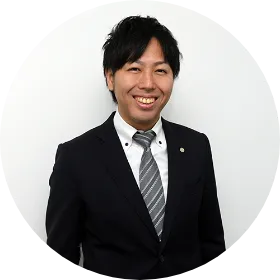
- Ryota Yanagimoto
- Administrative Scrivener/Judicial Scrivener
At the age of 24, he passed the national examinations for judicial scrivener, administrative scrivener, and wage service manager at the same time.
While working as a full-time lecturer at a major prep school, he independently opened a legal office related to judicial scriveners and administrative scriveners,
and he has experience as a judicial scrivener and an administrative scrivener for more than 15 years so far.
He has been actively contributing to various industries such as publicly listed companies, real estate companies, financial institutions, elderly care services, and professional organizations by conducting seminars, lectures, and talks.
And now he has a record of over 60 presentations so far.
Furthermore, as the president of a Japanese language school announced by the Ministry of Justice and Acts, and an advisor to a real estate company (capable of handling foreign clients),
he has been involved in various aspects of industries related to foreigners.






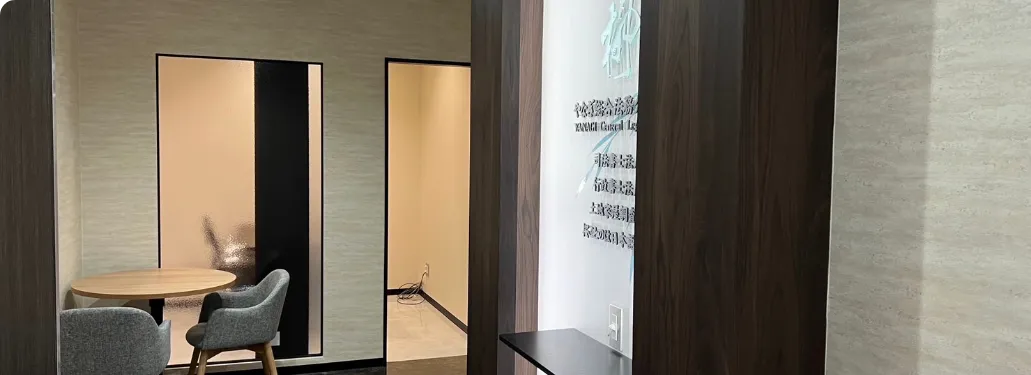
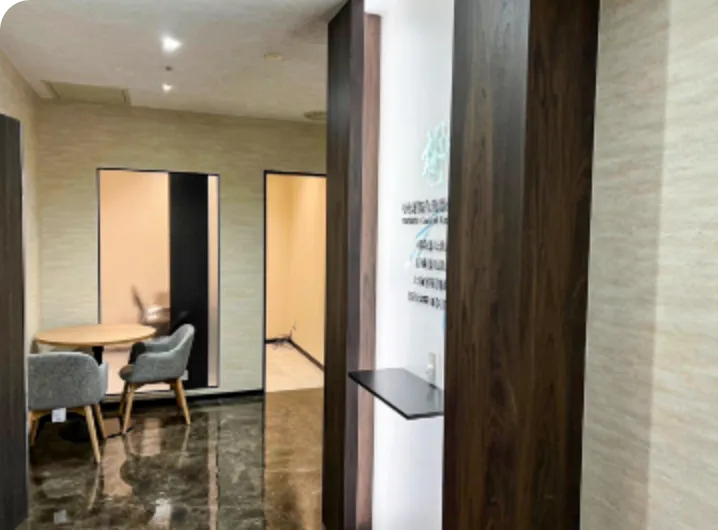
 0120-138-552
0120-138-552 Free
Consultation
Free
Consultation Contact Us
Contact Us